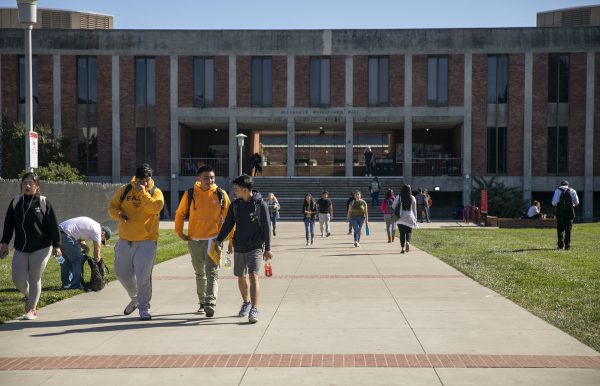Pioneer Dining: Delicious or Suspicious?
March 5, 2020
Food is all around us and our everyday lives. It tells stories, opens people’s minds to new cultures, and allows people to get the nutrients to become the best possible version of themselves. As humans, we often gorge ourselves on these delectable items and strive to try new things. We want to hear stories about amazing food and we want to flourish in our own experiences while eating it. Unfortunately, not all food has a great story though. All it takes is one little mistake to change your fairy tale into a nightmare. It can be anything from serving old food to the classic “there’s a hair in my burger,” or even food poisoning. The smallest details can derail our dining experiences.
Food is necessary sustenance that helps students stay in great physical and mental health. California State University, East Bay offers meal plans in order to accommodate students who reside on campus. The various meal plans are as follows: the Red and Black plan cost between $1500- $2500 a year while the block plans range from $600-625.
One student who pays for these plans out of her own pocket is named Daza Graham and she has her own grisly experience with campus food. After trying to enjoy a meal at Taco Bell she discovered a caterpillar in her food. Yes, you read that right, a caterpillar.
“I work a lot so I eat on campus 2-3 times a week for convenience; The day of the incident I was in a rush so I went to Taco Bell. I usually check my food but that day I was so hungry so I didn’t check it. After I ate my first taco, I realized I had not checked the food so I checked the second one and that was the first thing I found, the caterpillar. I was extremely upset because, as a student, I pay [for] tuition and a meal plan so I expect quality food, not insects in my meal”.
After this incident, Graham returned to Taco Bell and gave them the taco. Their initial response was to give her a refund and coupons but they kept the taco for “investigative purposes”.
With the amount of money that students are paying for these plans, you would think that they would receive good quality, healthy food. The unfortunate thing is that this is not always the case. In the last three months, there have also been numerous complaints made against restaurants on campus about the poor quality of the food.
“Compared to last year, the food has gone down in quality. They went from serving fresh food to serving food under a heat lamp. They also lost many options for food,” says Kyle Manley, a sophomore on campus who spends his own hard-earned money on meal plans.
Friends of Graham’s have also had less than appealing experiences with the food at the dining commons as well.
Another complaint made by a student came from Edward Soper, who received food poisoning due to Panda Express, another “nutritional option” here on campus. “After I ate [the chowmein], I became nauseated and felt very hot and sweaty. Eventually, I went outside and vomited; this is the only time I have gotten sick from food on campus”.
While Soper does not live on campus, he deserves access to quality food while in school. It is not fair that he pays for food that makes him sick, in addition to his tuition. Soper also has a colleague who reported getting food poisoning from Panda Express the same day, but they did not wish to speak about it.
Pioneer Dining has been working with students who experience this type of incident, including Graham.
“After I found the caterpillar, two individuals from Pioneer Dining reached out to me and asked how they could make the situation better and, at the time, the only answer I had was for them to check the food and go through it and thoroughly investigate before it was served.”
Even with the timely response from Pioneer Dining, the question remains: Do they actually care about the quality of the food being served or is this response them simply putting out a P.R. fire?
While Pioneer Dining’s responses have been quick and appropriate, students like Graham and Soper are wondering what will they do to prevent this from happening again?
“I think these people need to do a better job,” Graham continued. “A refund is fine, but how are they going to prevent this from happening and how are they going to get students to continue to eat at the restaurants.”
Graham also continued on to say that, due to the nature of her post, many of her friends have stopped eating at Taco Bell and some have even gone vegan or vegetarian to avoid eating campus food altogether. Since her friends have changed their diets, Graham has noticed how hard it is for them to find food to eat on campus.
The campus used to have a healthy option called Greens to Go but, as of last year, it has been replaced with a sushi restaurant leaving students with less healthy options to eat.
Besides the chain restaurants on campus, Pioneer Dining has also incorporated food trucks which offer many healthy options and culturally different food. These trucks have been proved to be positive with students, leading to lines that go on for miles.
“I really like the food trucks. I always see lines when I pass by,” Graham said, “Maybe if they sent out a survey to see what the students want, it would be nice to see that the school is listening to what we as students want.”
Soper had his own ideas about how campus could improve the quality of its food. He believes it is a matter of how employees are handling the food as well as the quality.
“I think that they should hire more outside workers and not as many students to ensure the quality of the food is not compromised.”
Graham had a final response directly to Pioneer dining that she wished to express.
“Do better, send out a survey, reach out to the people who actually eat here and see what they want. Even though I am graduating, it would be great to see new restaurants that students actually want to have here on campus”.















